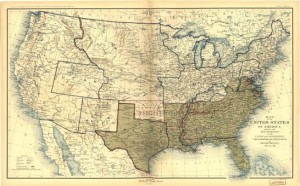 Baptist newspaper editors of the South search Northern papers for any hint of negative press regarding the United States, often re-printing suitable articles with appropriate commentary. Such is the case in this week’s Virginia Religious Herald newspaper.
Baptist newspaper editors of the South search Northern papers for any hint of negative press regarding the United States, often re-printing suitable articles with appropriate commentary. Such is the case in this week’s Virginia Religious Herald newspaper.
We are indebted to a friend, for a late copy of the New York Independent–the organ of the Beecher wing of Abolitionists. The following extract from “the leader” will show a marked abatement of the sanguine hopes–the “hallucinations”–under which our enemies contemptuously swept aside Southern overtures for a peaceful dissolution of the Union. The prospect of our subjugation must “look bleak in the cold wind,” when so vaunting a paper finds occasion to prophesy delay, in the audience of “the one hundred thousand readers” of which it boasts. But let us hear the Independent:
“When Coleridge was asked by a lady if he believed in ghosts, he replied, “No, madam, I have seen too many of them to believe in them.” We have too often heard the rebellion called ended, to believe it ended yet. The conspiracy has nine lives, like a cat. Poisonous vines are harder to kill than flower-stalks. The war, at the beginning, was a great undertaking: it has grown greater every day since. That the settlement is not far off, we fully believe; but that we are likely to read of it in tomorrow morning’s newspaper, we have no faith. * * * The wrestlers are still in the ring, and neither thrown. Without doubt, the war will yet be ended in ‘ninety days’–but they may be Mosaic days, such as the Secretary of State saw in his vision. The rebellion, perhaps, is not yet half crushed. Chattanooga shows not only that hard work has just been done, but that hard work remains to be done. The Cumberland Mountains may at this hour stand capped with battle-smoke, and out of this cloud the fiery bolt may strike our foes or our friends. Victory and defeat seem hanging like equal weights in the scale. Great campaigns, either among swamps or among mountains, do not blossom into victories as easily as morning-glories bloom. We must have patience. McClellan did not Richmond in a day….”
McClellan, of course, never took Richmond, but rather was driven back following a long and ineffective campaign. The Confederacy is indeed resilient and intends to never surrender. Settling now into a war of attrition, the South hopes to wear down the will of the North before the supply of white Southern men runs too low. Despite the bravado in Southern Baptist newspapers, there are already indications–evident in the growing rate of soldier desertions and the increasing difficulty of finding new recruits–that this strategy will be in vain.
Victory for the United States may not come on the morrow, but the Mosaic days referenced–an allusion to a common view that the days of creation in the Genesis biblical account are long periods of time, rather than literal 24-hour days–do have limitations, in this instance.
Source: “Deferred Hope,” Religious Herald, October 29, 1863


